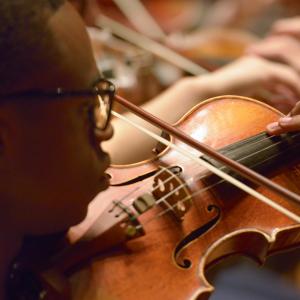NEC Philharmonia + Hugh Wolff: Eastman, Copland, & Bartók
NEC Philharmonia presents works by Julius Eastman, Aaron Copland, and Béla Bartók, performed live in Jordan Hall and streamed to your home.
Watch live stream from Jordan Hall:
Julius Eastman | The Holy Presence of Joan D'Arc (1981)
The loneliness of the outsider is expressed in three unusual ways in tonight’s concert.
The brilliance of Julius Eastman was extinguished far too early when he died, homeless at age 49 in 1990. A gifted singer, pianist, and improviser as well as composer, he described himself as "Black to the fullest, a musician to the fullest, a homosexual to the fullest." His style has been described as an ecstatic, emphatic, even militant kind of minimalism, which he invented well before minimalism became mainstream. He wrote this about his The Holy Presence of Joan d’Arc:
Dear Joan,
Find presented a work of art, in your name, full of honor, integrity, and boundless courage. This work of art, like all works of art in your name, can never and will never match your most inspired passion. . . . I offer it as a reminder to those who think that they can destroy liberators by acts of treachery, malice, and murder. They forget that the mind has memory. They forget that Good Character is the foundation of all acts. They think that no one sees the corruption of their deeds, and like all organizations (especially governments and religious organizations), they oppress in order to perpetuate themselves. Their methods of oppression are legion, but when they find that their more subtle methods are failing, they resort to murder. Even now in my own country, my own people, my own time, gross oppression and murder still continue. Therefore I take your name and meditate upon it.Only the first two pages of the score survive; the rest is lost. The sheet music used today was transcribed by cellist Clarice Jensen from the 1981 recording of the piece.
Personnel
Cello
Jonathan Swensen
Yunwen Chen
Sebastian Ortega
Ben Maxwell
Mari Nagahara
Pi-Wei Lin
Isaiah Applbaum
Yi-Mei Templeman
Emma Fisher
Eunice KimAaron Copland | Quiet City (1941)
In 1939, Aaron Copland wrote incidental music for Irwin Shaw’s play Quiet City. The play centered on a lonely Jewish boy who plays jazz trumpet. Copland’s music, for an ensemble of clarinet, saxophone, trumpet and piano, was designed to express the loneliness and anxiety of the central characters. Two years later, Copland crafted a concert piece from the musical material, rescoring it for trumpet, English horn, and strings. Brooding and elegiac, the music borrows from both jazz and Jewish music: the bending of melodic blue notes and the repetitive insistence of the shofar.
Personnel
First Violin
SooBeen Lee
Evan Hjort
Victoria Pan
Haekyung Ju
Qiyan Xing
Grant HoustonSecond Violin
Jiyoung Lee
Nozomi Murayama
Cameron Alan-Lee
Natalie Boberg
Alison KimViola
Santiago Vazquez-Loredo
Chiau-Rung Chen
John Harry Clark
Anabel Tejeda
Cello
Ben Maxwell
Yi-Mei Templeman
Isaiah Applbaum
Bass
Gregory Miguel Padilla
Yihan Wu
English horn
Kip ZimmermanTrumpet
Cameron AbtahiArtists- Kip Zimmerman, English horn
- Cameron Abtahi, trumpet
Béla Bartók | Divertimento for string orchestra, Sz 113, BB 118 (1939)
I. Allegro non troppo
II. Molto adagio
III. Allegro assaiBéla Bartók wrote Divertimento in 1939 on commission from the Basel Chamber Orchestra and its wealthy founder and conductor Paul Sacher. It is based on the Baroque concerto grosso, which features a small ensemble (concertino) within a larger group (ripieno). Here the solo string quintet and the full string ensemble engage in intricate counterpoint and dialogue. The other inspiration, so often with Bartók, is the folk music of Hungary and Rumania. The exuberant outer movements are full of melodic and rhythmic folk elements but the central slow movement seems much more Bartók’s inner voice. Nazism was ascendant in 1939; Bartok was preparing to flee Europe as war loomed. This intense movement is filled with despondency, ominous rumblings, and cries of despair.
Personnel
First Violin
SooBeen Lee
Evan Hjort
Victoria Pan
Haekyung Ju
Qiyan Xing
Grant HoustonSecond Violin
Jiyoung Lee
Nozomi Murayama
Cameron Alan-Lee
Natalie Boberg
Alison KimViola
Santiago Vazquez-Loredo
Chiau-Rung Chen
John Harry Clark
Anabel Tejeda
Cello
Jonathan Swensen
Yunwen Chen
Pi-Wei Lin
Bass
Gregory Miguel Padilla
Yihan WuArtists- SooBeen Lee, violin 1
- Jiyoung Lee, violin 2
- Santiago Vazquez-Loredo, viola
- Jonathan Swensen, cello
- Gregory Miguel Padilla, double bass
"The three pieces on this evening’s concert exploit the...
NEC Philharmonia presents works by Jessie Montgomery, Dmitri Shostakovich, and Gabriela Lena Frank, performed in Jordan Hall and streamed live to your home. This evening's program led by guest...

